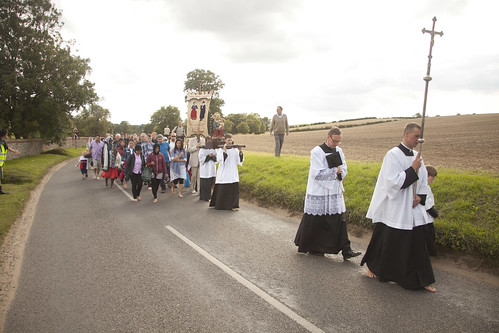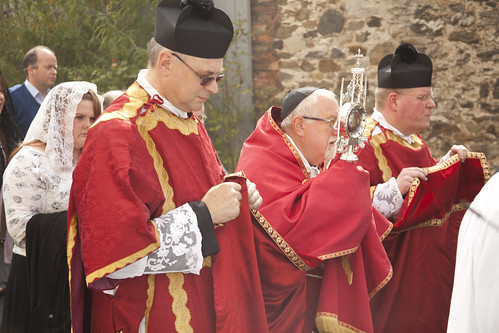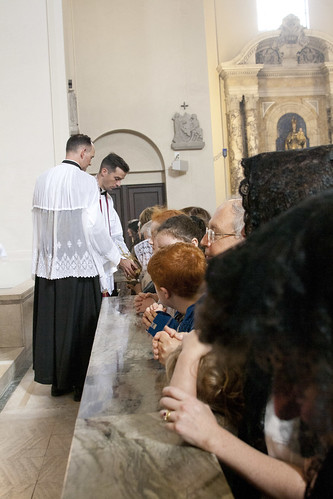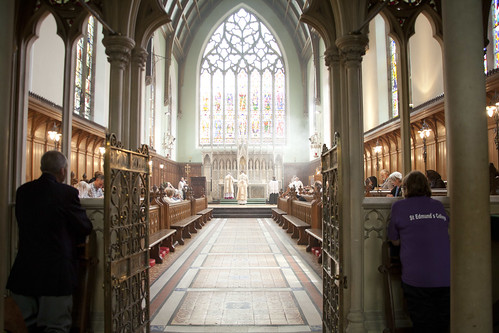 |
| How to annoy a Jansenist. 1 Have lots of processions. |
Winters' substantive point has a similar level of accuracy. He thinks that the key to Pope Francis' critique of 'moralism', 'legalism', 'ideology' and so on is a rejection of Jansenism. (For my own interpretation, see here.)
Thompson fails to see that the Holy Father, above all, is engaged in an old struggle for the Society of Jesus: He is confronting the Jansenists of our day, the very same conservative Catholics in the English-speaking world whom Thompson thinks have the fire of the Gospel in their bellies. It is not the Gospel, but a hyper-moralistic concern against spiritual contagion that animates the conservatives Thompson champions. And, quite clearly, this is not what animates Pope Francis.
Has Winters even looked up Jansenism in a reference book? He doesn't appear to have a clue about it. They were not 'conservative Catholics': they were crypto-Calvinist heretics.
Leaving the matter at the level of the cartoon history of the Church, the Jansenists were an 18th century group of Catholics, eventually condemned by the Pope, and who eventually formed a schismatic Church in the Netherlands, characterised by a kind of crypto-Calvinism. This manifested itself in the rejection of free will and the notion of cooperation with grace, on which subject they quickly became locked in a ferocious pamphlet war with the Jesuits. The Jansenists included some brilliant polemicists, notably recruiting Blaise Pascal to their cause. The notion of unscrupulous Jesuits working out how to avoid the moral law owes more to these guys than to English or German Protestant polemicists of the 16th and 17th century.
 |
| 2. Honour a saint (like St Winefride) whose legend is bound up in folklore. |
In the earlier years, they allied with Gallicans who rejected the authority of the Pope. Later, they joined up with the 'Old Catholics' who rejected the Doctrine of Papal Infallibility, gave Episcopal Orders to Anglicans, and are the root of all the loopy 'liberal Catholic churches' you can find on the internet.
 |
| 3. Or even better, one whose cult, like St Philomena's, is founded on the supernatural. |
There is also a contrast, of course: the original Jansenists preached a very strict morality, in particular keeping people away from the Blessed Sacrament for long periods on the grounds that they needed a more profound 'conversion'. In this respect the Jansenistic impulse has developed in the same way as mainstream Protestantism: having been super strict, now they'll accept anything. The real, continuing Jansenists in Holland have spent recent decades have splits over issues like the ordination of women and openly gay clergy.
Michael Sean Winters has American neo-conservatives in his sights, and while I've plenty of criticisms to make of them, they are not the same criticisms as the ones which should be made of Jansenists. Let's make this really clear.
1. Papal authority: Neo-conservatives have an exaggerated view of it; the Jansenists made the opposite mistake, minimising Papal authority.
2. The effects of sin and grace: Jansenists had an exaggerated (Calvinistic) view of it; Neo-cons, if anything, give insufficient emphasis on the effects of sin and grace.
3. Liturgical participation: the Jansenist view of vocal participation and instant comprehensibility is directly opposed by those neo-cons who have embraced the Reform of the Reform.
Winters just sees some people in the 18th century who claimed to take morality seriously, and he thinks their name applies to anyone who opposes destructive research on human embryos, not just in theory but in practice. That is ridiculous. You could make a very long list of heresies which adopted moral rigorism as a way to impress people with their holiness; they don't necessarily have anything else in common.
 |
| 4. Celebrate an other-worldly liturgy, using Latin and silence. |
(Pope Francis' uses of the term 'casuistry' to indicate rigorism, instead of the moral laxism criticised by the Jansenists, just goes to show how useless technical terms become once they are adopted as terms of abuse.)
Jansenism disappeared as a real force in the Church along with the rest of 'Enlightenment Catholicism', Josephism, Febronianism, and the like, with the end of the Napoleonic wars. Thus began the great Catholic revival, particularly in France, which created the institutions and developed the devotions which formed the backdrop to the Second Vatican Council. Rationalism continued to wait in the wings, however, for opportunities to assert itself again. Many Jansenist dreams were fulfilled after the Council. In other cases, the debate had moved on. In some respects the cult of Reason has given way to the cult of the Emotions.
Now things have moved on again. The conservative and traditionalist revival which so alarms Michael Sean Winters is evidence of the perennial appeal of the teaching of the Church. Just when you think you've locked all that medieval nonsense up in a box, out it pops to inspire a new generation.
 |
| 5. Encourage frequent reception of Holy Communion. |
Yes, 'Jansenist' has, like 'fascist', become a general disapprobative term. The only thing which surprises me in Winters' article is the absence of 'Pharisee' or 'Pharisaical'.
ReplyDeleteThe irony is that Jansenism has become resurgent in the Church, but amongst charismatics, not traditionalists (except in the Ireland and the U.S. where it never went away, but that's another story). In most cases it's influence is on attitudes towards religion and formal worship, but it finds its purest expression in a certain group that will remain nameless, but which causes a great deal of disruption to parish life wherever it is found.
ReplyDeleteI think you mean the Habsburg Grand Duke of Tuscany who called the Synod of Pistoia...
ReplyDelete"Yes, 'Jansenist' has, like 'fascist', become a general disapprobative term."
ReplyDeleteExactly.
One finds a similar criticism made of the old Irish Church, both in Ireland and in America, despite any lack of tangible connection with Jansenist schools or groups in France; what the critics of these Irish clerics really have in mind is mere moral rigorism (which was, indeed, in some cases excessive).
When i was a Charismatic Catholic I read Blaise Pascal's writings. Some of his insights sparkled. An amazing saint.
ReplyDelete